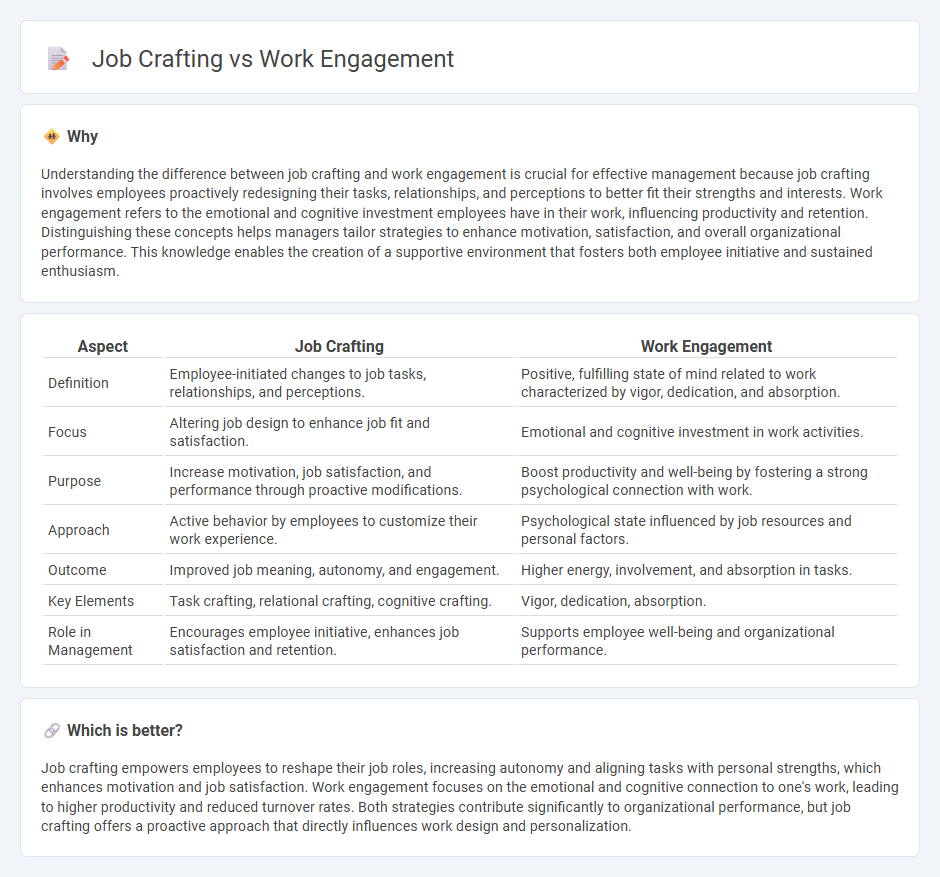
Job crafting empowers employees to reshape their tasks and relationships, enhancing intrinsic motivation and alignment with personal strengths, which directly boosts work engagement levels. Work engagement reflects a positive, fulfilling state where employees exhibit vigor, dedication, and absorption in their roles, leading to improved performance and organizational commitment. Explore how integrating job crafting strategies can effectively elevate work engagement and drive business success.
Why it is important
Understanding the difference between job crafting and work engagement is crucial for effective management because job crafting involves employees proactively redesigning their tasks, relationships, and perceptions to better fit their strengths and interests. Work engagement refers to the emotional and cognitive investment employees have in their work, influencing productivity and retention. Distinguishing these concepts helps managers tailor strategies to enhance motivation, satisfaction, and overall organizational performance. This knowledge enables the creation of a supportive environment that fosters both employee initiative and sustained enthusiasm.
Comparison Table
| Aspect | Job Crafting | Work Engagement |
|---|---|---|
| Definition | Employee-initiated changes to job tasks, relationships, and perceptions. | Positive, fulfilling state of mind related to work characterized by vigor, dedication, and absorption. |
| Focus | Altering job design to enhance job fit and satisfaction. | Emotional and cognitive investment in work activities. |
| Purpose | Increase motivation, job satisfaction, and performance through proactive modifications. | Boost productivity and well-being by fostering a strong psychological connection with work. |
| Approach | Active behavior by employees to customize their work experience. | Psychological state influenced by job resources and personal factors. |
| Outcome | Improved job meaning, autonomy, and engagement. | Higher energy, involvement, and absorption in tasks. |
| Key Elements | Task crafting, relational crafting, cognitive crafting. | Vigor, dedication, absorption. |
| Role in Management | Encourages employee initiative, enhances job satisfaction and retention. | Supports employee well-being and organizational performance. |
Which is better?
Job crafting empowers employees to reshape their job roles, increasing autonomy and aligning tasks with personal strengths, which enhances motivation and job satisfaction. Work engagement focuses on the emotional and cognitive connection to one's work, leading to higher productivity and reduced turnover rates. Both strategies contribute significantly to organizational performance, but job crafting offers a proactive approach that directly influences work design and personalization.
Connection
Job crafting enhances work engagement by empowering employees to redesign their job tasks, relationships, and cognitive perceptions, which increases meaningfulness and motivation. Engaged employees exhibit higher energy, dedication, and absorption in work, leading to improved performance and job satisfaction. This connection underscores the importance of fostering autonomy and proactive behavior in management practices to sustain engaged and productive teams.
Key Terms
Motivation
Work engagement reflects an employee's emotional and cognitive investment in their role, significantly enhancing intrinsic motivation and overall job satisfaction. Job crafting empowers individuals to proactively modify tasks, relationships, and perceptions, fostering autonomy and aligning work with personal strengths, which boosts motivation and productivity. Explore effective strategies to leverage both work engagement and job crafting to maximize workplace motivation and performance.
Autonomy
Work engagement thrives when employees experience high autonomy, enabling them to fully invest energy and enthusiasm in their job roles. Job crafting allows individuals to shape their tasks and interactions, enhancing autonomy by tailoring roles to personal strengths and preferences. Discover how enhancing autonomy through job crafting can boost work engagement and organizational performance.
Proactivity
Work engagement enhances employee motivation and energy toward job tasks, fostering proactive behaviors that improve performance. Job crafting involves employees actively redesigning their work roles, allowing them to shape job demands and resources to better align with personal strengths and interests. Explore how these proactive approaches empower individuals to thrive in dynamic work environments.
Source and External Links
Work engagement - Wikipedia - Work engagement is a positive, fulfilling, work-related state of mind characterized by vigor, dedication, and absorption, where employees physically, cognitively, emotionally, and mentally invest themselves in their work roles.
Work Engagement: Organizational Attribute or Personality Trait? - Work engagement significantly influences organizational performance and is shaped by both individual personality traits and organizational climate factors, encouraging proactivity, innovation, and improvement efforts from engaged employees.
How to Improve Employee Engagement in the Workplace - Gallup.com - Employee engagement, defined by involvement and enthusiasm in work, drives higher productivity, profitability, customer loyalty, and lower absenteeism and turnover, marking it as a key performance strategy for business success.
 dowidth.com
dowidth.com